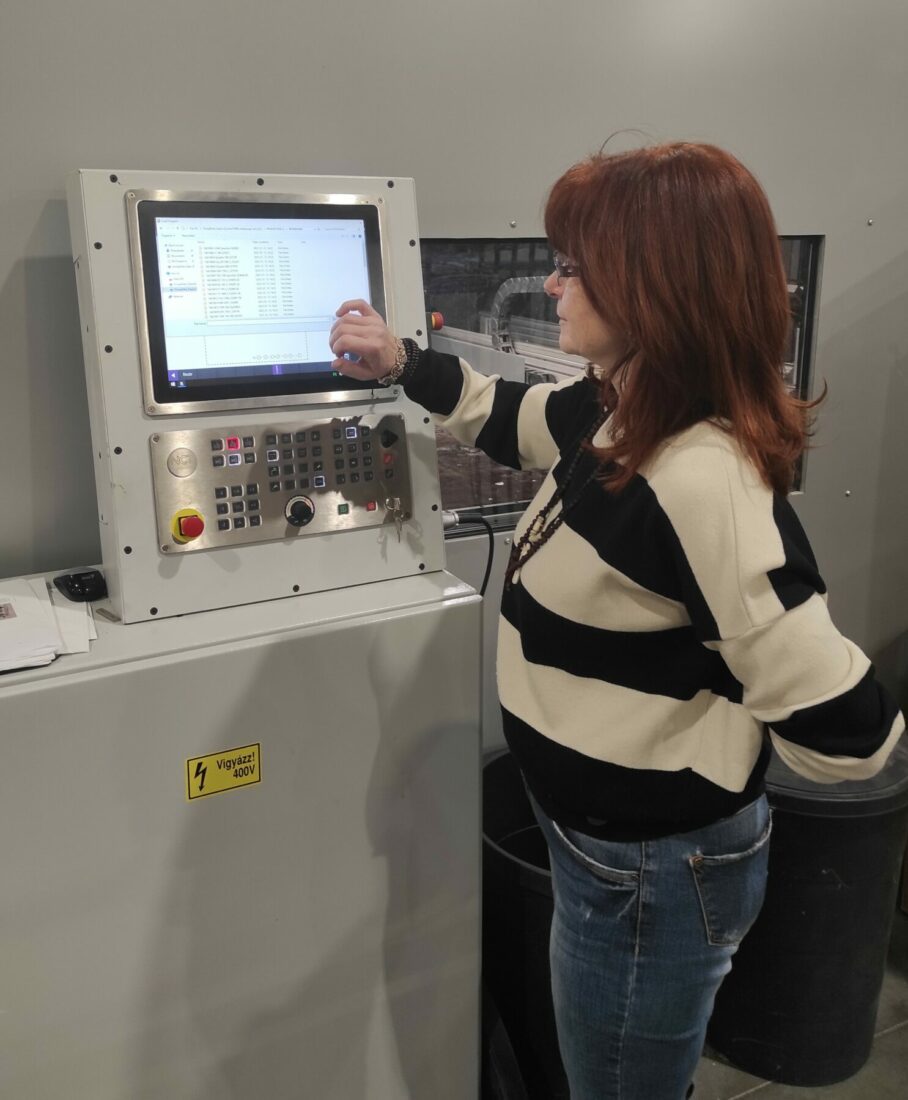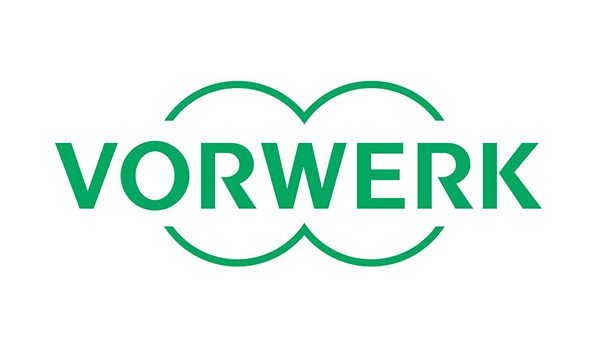When searching for energy-efficient home heating systems, many people find themselves asking, “Can you heat a whole house with a heat pump?” The answer is not a simple ‘yes’ or ‘no’. Several factors come into play, such as the size and quality of your home’s insulation, the local climate, and of course, the type of heat pump.
This article aims to guide you through these considerations, providing you with a comprehensive understanding of whether a heat pump can meet your home heating needs. By the end, you should have a better understanding of the feasibility and practicality of using a heat pump to heat your entire home. So, let’s dive in and explore the world of heat pumps.
In this article, we will cover topics such as:-
- The basics of heat pumps
- Whether you can heat your whole home with a heat pump
- Assessing the size and insulation of your home
- Choosing the right type of heat pump
- Heat pumps for a large house
- Costs and energy efficiency of heat pumps
- Government incentives and rebates for heat pumps
- Tips on heating your house with a heat pump
- Common questions about heat pumps
Understanding The Basics Of Heat Pumps
A heat pump is a device that uses a small amount of energy to move heat from one location to another. It is not too dissimilar to an air conditioner, but while an air conditioner only cools air, a heat pump can either heat or cool. This is achieved by reversing the flow of its refrigerant.
When heating a home, for example, the pump extracts heat from the outside air and transfers it inside. Conversely, when cooling, it takes the heat from inside the home and moves it outside. Understanding the heat pump process is fundamental to further exploring the potential of heating a whole house with a heat pump.
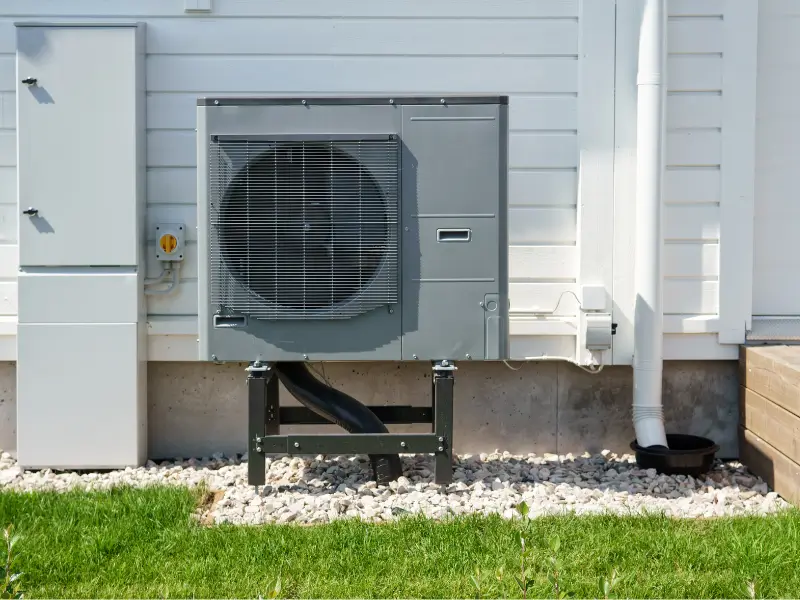
Assessing The Size And Insulation Of Your Home
Specialist installers will help to assess your home’s size and insulation status, as these factors can greatly impact the efficiency of a heating system. A small, well-insulated home may be more easily and efficiently heated by a heat pump than a larger, poorly insulated one.
Factors such as wall insulation, double glazing, and the age of the house can all impact heat retention. The size of your home in square footage will also determine the size and type of heat pump you’ll need. Larger homes may require multiple heat pumps or a more powerful system. Therefore, before deciding on a heat pump as your heating solution, thoroughly assess your home’s size and insulation conditions.
Considering The Climate And Temperature Range
It’s crucial to consider your local climate and temperature range when deciding on a heating system, as these factors can significantly influence the performance and efficiency of the chosen system. A heat pump, for instance, works optimally in moderate climates where the temperature rarely drops below freezing. This is because the system extracts heat from the outdoor air to warm the house.
In extremely cold climates, the heat pump may struggle to provide sufficient heat and may need to be supplemented with another heat source. On the other hand, in mild climates, a heat pump can efficiently heat your whole house, reducing energy consumption and lowering your utility bills. Consequently, understanding your local weather patterns and temperature fluctuations is pivotal in deciding if a heat pump is the right heating system for your home.
Learn more about how heat pumps work.
Can You Get A Heat Pump For A Large House?
When considering a heat pump for a large house, it’s important to understand that the size and layout of your home will significantly influence the type and number of heat pumps needed. Here’s a detailed look at how you can effectively heat a large house with a heat pump.
Sizing and Efficiency: For a large house, the heat pump system must be adequately sized to ensure efficient heating. An undersized system will struggle to maintain a comfortable temperature, while an oversized system may cycle on and off too frequently, reducing efficiency and lifespan. A specialist installer will calculate the heating load based on your home’s square footage, insulation quality, and layout to recommend the right size.
Multiple Units and Zoning: In many cases, a single heat pump may not suffice for a large house. Multiple units can be installed to ensure consistent heating throughout. Additionally, implementing a zoning system allows different areas of the house to be heated independently. This not only improves comfort but also increases energy efficiency by allowing you to heat only the areas in use.
Types of Heat Pumps Suitable for Large Homes:
- Air Source Heat Pumps: These are popular due to their lower installation costs and versatility. However, in a large home, you might need multiple air source units or a more powerful system to provide adequate heating.
- Ground Source (Geothermal) Heat Pumps: These are highly efficient and ideal for large homes. Although the initial installation cost is higher, they offer significant long-term savings and consistent heating performance.
- Water Source Heat Pumps: If your property is near a sufficient water source, this type can be highly efficient for a large house, offering another viable option for consistent heating.
Integration with Existing Systems: For large homes with existing heating systems, integrating a heat pump can enhance overall efficiency. Hybrid systems, where a heat pump works alongside a traditional boiler, can provide the necessary heating capacity during peak demands.
Installation and Professional Advice: Installing a heat pump in a large house is a complex process that requires professional assessment and installation. Consulting with experienced installers ensures that the system is tailored to your home’s specific needs, ensuring optimal performance and efficiency.
Long-Term Benefits: Despite the higher initial investment, heat pumps offer substantial long-term benefits for large homes. These include lower energy bills, reduced carbon footprint, and the convenience of a dual heating and cooling system. Additionally, government incentives and rebates can help offset some of the upfront costs.
Choosing the right heat pump for a large house involves careful consideration of the system’s size, type, and installation process. By consulting with professionals and considering the unique needs of your home, you can achieve efficient and effective heating that enhances comfort and reduces energy costs.
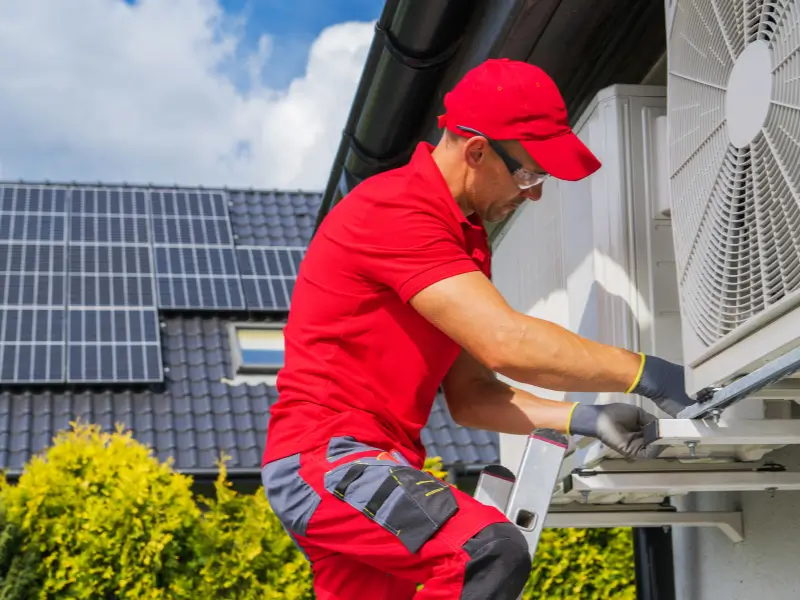
Choosing The Right Type Of Heat Pump
Choosing the perfect pump can be a bit of a puzzle, but don’t worry, this is why is so important to talk to specialist installers about the best option for you.
Heat pumps come in three different types: Air-to-Air, Geothermal, and Water Source. Air to air heat pumps are the most common, exchanging heat with the outside air. Geothermal heat pumps use the stable temperature of the earth as a heat source, making them more efficient but also more expensive. Water Source pumps use water as a heat transfer medium, ideal for regions near bodies of water.
The choice between these types depends on your budget, location, and the size of your house. Always consult a professional for the best advice before making a decision.
Evaluating Costs And Energy Efficiency
The initial investment for a heat pump might be higher than traditional heating systems, but it’s important to consider the long-term savings. Heat pumps are incredibly energy-efficient, converting most of their energy into heat. This efficiency translates into lower energy bills, which can offset the higher upfront costs over time. Furthermore, the type of heat pump you choose also impacts the cost and energy efficiency.
For instance, air-source heat pumps are less expensive and easier to install, but geothermal heat pumps, although pricier and more complex to install, offer greater energy efficiency. It’s also worth mentioning that government incentives can help offset installation costs, making heat pumps an economical choice for heating a whole house.
Learn more about the energy-efficiency of heat pumps and HVAC systems
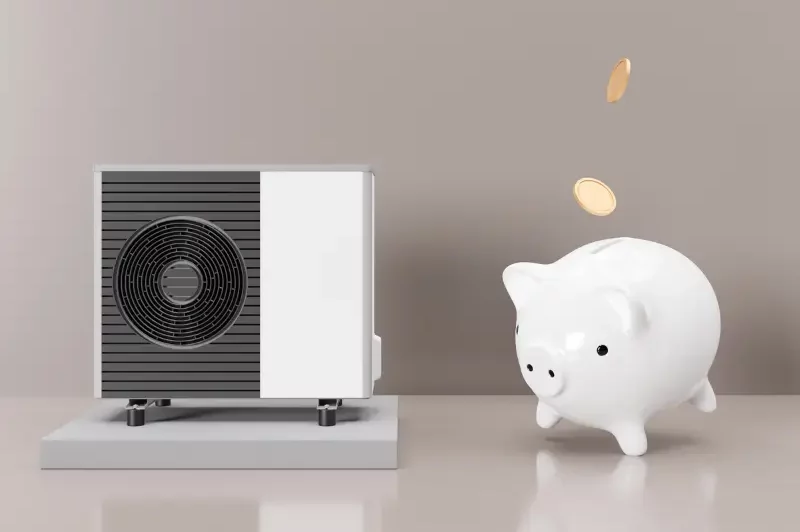
Are There Any Government Incentives For Installing A Heat Pump?
Yes, there are several U.S. government incentives available for those considering installing a heat pump. These incentives can significantly reduce the upfront cost and make heat pumps an attractive option for energy-efficient home heating. Here’s a breakdown of the main incentives:
Federal Tax Credits:
- Inflation Reduction Act (IRA): If you install an efficient heat pump between now and 2032, you are eligible for a federal tax credit that covers 30% of the cost, up to $2,000 annually. This tax credit is designed to help homeowners invest in energy-efficient technologies without a cap on income, as long as there is tax liability.
- Efficiency Requirements: To qualify, the heat pump must meet specific efficiency standards, ensuring it is part of the Consortium for Energy Efficiency’s highest non-advanced tier (Environment America) (Environment America)
Government Rebates:
- State-Administered Rebates: These vary by state and are aimed at lower and middle-income households. Depending on income levels, rebates can cover up to 100% of the cost for heating and cooling heat pumps (up to $8,000) and heat pump water heaters (up to $1,750).
- Income Tiers: Households earning less than 80% of the state’s median income can receive full rebates, while those earning between 80% and 150% of the median income can receive 50% rebates. These rebates are expected to be implemented through state programs (Environment America) (Environment America).
Additional Incentives:
- Electric Panel Upgrades: Rebates are also available for necessary home upgrades to support heat pump installations, such as electric panel upgrades (up to $4,000 for low-income households).
- Electric Wiring: Similarly, rebates can cover upgrades to electric wiring, essential for integrating new heat pump systems (up to $600 for low-income households) (Environment America) (Environment America).
Benefits of These Incentives:
- Cost Savings: These incentives reduce the upfront cost of heat pump installations, making them more accessible and affordable.
- Energy Efficiency: Investing in a heat pump can lead to substantial energy savings over time, as heat pumps are significantly more efficient than traditional heating systems.
- Environmental Impact: Heat pumps reduce reliance on fossil fuels, thereby decreasing greenhouse gas emissions and contributing to cleaner air and a healthier environment.
By taking advantage of these federal tax credits and rebates, homeowners can make a smart investment in energy efficiency that pays off through lower utility bills and environmental benefits. For more detailed information on these incentives and how to apply, you can visit the Environment America and Energy Star websites.
Frequently Asked Questions
Heat pump systems necessitate regular maintenance for optimal performance. This includes annual service checks, regular filter changes, outdoor unit cleaning, and occasional coil and fan inspections by a professional HVAC technician. Learn more about heat pump maintenance.
Yes, heat pumps are versatile and can provide cooling during summer months. In cooling mode, they work by extracting heat from inside the home and transferring it outside, effectively cooling the indoor space.
The duration to install a heat pump system can vary significantly. However, for an average-sized home, it typically takes between 1 to 3 days. This timeline depends on the complexity of the installation process.
Yes, heat pumps have potential environmental impacts. They can contribute to global warming if they leak refrigerants, which are potent greenhouse gases. However, they are still more eco-friendly than traditional heating systems.
Yes, a heat pump can function efficiently in a multi-story house. It’s designed to manage temperature distribution across different levels, ensuring a comfortable environment throughout the home, regardless of the number of floors.
Final Words
Whilst Enbi does not make Heat Pumps, the work we have done with the world’s leading producers helps us to have a good insight into the market and the considerations in making the right selection. One thing is for sure, our range of thermal and acoustic insulation materials will help to reduce noise and energy consumption regardless of the heat pump type.




